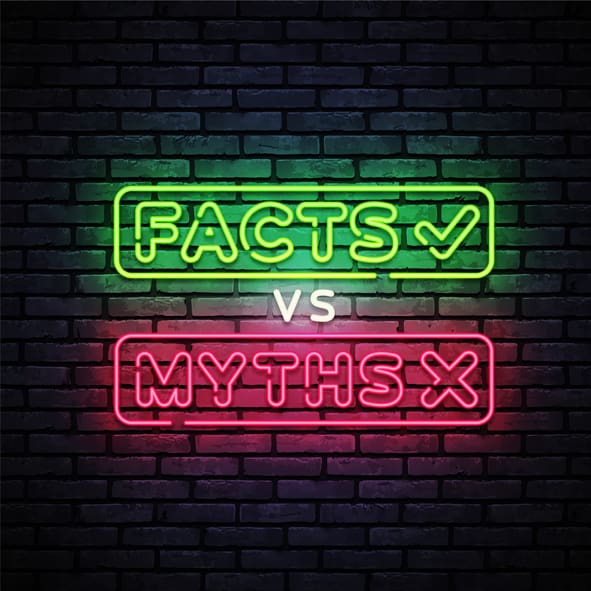A myth is a false idea or belief about something many people believe to be true. Drug and alcohol addiction and recovery are areas in which myths abound. The myths are damaging to everyone: the people struggling with addiction, their families, and the general population. When people believe a myth, it often influences their judgment, behavior, and actions.
Eight Myths About Addiction and Recovery
Myths about addiction contribute to the stigma people with the disease face, which can discourage them from getting the treatment they need. Below are eight myths about addiction and recovery.
- Myth: Addiction is a choice.
Addiction is not a choice. It is not a moral failing. Addiction is a chronic brain disease. It starts as a choice when the person voluntarily decides to have an occasional drink or use a drug. Over time, as the person continues drinking or using drugs, the substance causes changes in the brain that result in an uncontrollable craving and compulsive use of the drug. - Myth: The first time a person receives addiction treatment, it should work.
Addiction is a chronic, relapsing brain disease. Like other chronic diseases, such as heart disease, asthma, and diabetes, addiction can be managed successfully. However, relapses may occur. If a person does relapse, it does not mean they are a failure. It does not mean their addiction treatment failed. It means the individual needs additional treatment. Addiction recovery is a life-long process, and everyone’s recovery path differs. - Myth: Heroin use is a young person’s problem.
Based on the false belief that people stop using heroin by their late 20s, the myth that only young people use heroin is false. According to the Anne Arundel County Department of Health in Maryland, one-third of people using heroin are aged 40 or older. The average age of people dying from heroin overdose is the late 30s. There is an increase in heroin overdose deaths of people in their 50s and 60s. - Myth: To be successful, a person must want addiction treatment.
Very few people want addiction treatment. Many people get addiction treatment because their family members successfully convinced them to enter treatment. Others are court-ordered to enter treatment for their addiction. Wanting to receive treatment does not mean the outcome will be more successful than a person entering treatment due to family pressure or court order. - Myth: Only hard drugs like heroin and cocaine are addictive.
Drugs like heroin, cocaine, and methamphetamines are addictive and dangerous. But all drugs have the potential to be addictive. Drugs considered recreational, such as alcohol and marijuana, can be addictive. Even prescription drugs, such as opioid painkillers or sleeping pills, can lead to addiction. According to the 2023 fact sheet from the National Institute on Drug Abuse, in 2019, 20.4 million Americans were diagnosed with substance use disorders. - Myth: People who are addicted can stop using or drinking anytime they want.
Overcoming an addiction is not easy. It takes daily commitment, dedication, and hard work. When a person is addicted to drugs or alcohol, their body is dependent on the substance. It needs the drug to function. Without it, the person experiences withdrawal from the drug. - Myth: If a person has a job and a family life, they cannot have a substance use disorder.
Even people who are very successful in their professional and personal lives and are high achievers can have a substance use disorder. They are functioning, or high-functioning, in their addiction. They are very good at keeping their addiction hidden. - Myth: It is easy to see who has a drug or alcohol addiction.
Many people have a picture in their heads of what a person struggling with an addiction looks like. The stereotypical picture may be of an unkempt woman with needle marks on her arms, an old man in dirty clothes holding a bag with a bottle inside, or a young man nodding out in a doorway. The truth is, most people with substance use disorders do not look like the stereotypes. They look like everyday people. Addiction does not discriminate. No matter your race, religion, income, age, profession, or family, addiction is possible.
Are You or a Loved One Struggling with Addiction?
If you or someone you care about is struggling with an addiction to drugs or alcohol, help is available. At Anabranch Recovery Center in Terre Haute, IN, our team of caring professionals can help put you on the path to recovery. We offer a range of programs to meet your specific needs, including detox, residential treatment, and a family program. Take the first step toward sobriety. Contact us today.




